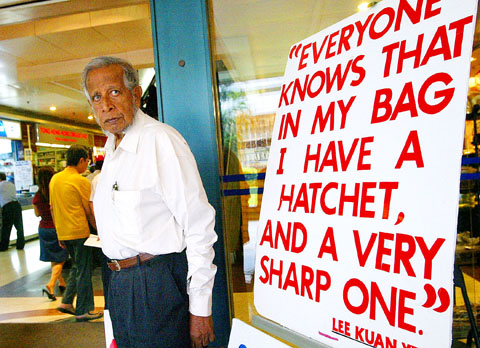Veteran Singaporean opposition leader J.B. Jeyaretnam died yesterday. He had waged a long and lonely campaign for greater political freedom in the tightly governed city-state.
He was attempting a fresh political comeback when he succumbed to heart failure.
The 82-year-old British-trained lawyer and former MP was the nemesis of Singapore’s iron-fisted founding leader Lee Kuan Yew (李光耀), 85, whose People’s Action Party (PAP) will celebrate 50 uninterrupted years in power next year.

PHOTO: AFP
“I haven’t got very many more years,” Jeyaretnam said in July at the launch of the new Reform Party, which was to be his vehicle for a comeback after years in the political wilderness.
Jeyaretnam, remembered by many Singaporeans for his old-school lambchop sideburns and a gravelly voice that thrilled audiences in court, parliament and street rallies, said he feared “no one except God.”
Born Joshua Benjamin Jeyaretnam in 1926 during a family visit to what is now Sri Lanka, he was often a solitary voice in largely ethnic Chinese Singapore, a prosperous financial center where protests are restricted and government critics complain of limited access to the media.
Despite being driven to financial ruin by costly defamation suits mounted by PAP leaders, and sidelined by younger opposition figures, Jeyaretnam was still plotting a return to parliament when he died.
“He’s such a man who never gives up ... fighting all the way,” long-time political ally Ng Teck Siong said on radio station 938Live after news of Jeyaretnam’s death was carried by the city-state’s pro-government media.
Singaporean leaders maintain that the Western-style democracy Jeyaretnam championed could ruin a tiny republic with no natural resources and surrounded by far bigger neighbors, an argument Jeyaretnam never bought.
During his career, Jeyaretnam spent more than US$900,000 paying off damages awarded to PAP leaders and had to sell off his house in Singapore, settling in his later years in the neighboring Malaysian city of Johor Bahru.
Lee, who ruled for three decades and still serves in the Cabinet of his son, Singaporean Prime Minister Lee Hsien Loong (李顯龍), never concealed his deep hatred of Jeyaretnam, calling him a “thoroughly destructive force” who was “all sound and fury.”
Even during his darkest days, Jeyaretnam soldiered on. He helped support his cause by selling books on the sidewalks of Singapore, and managed to clear his debts to pave the way for a fresh stab at public office.
“I get my strength from somewhere else, if you know what I mean,” he said in an interview in 2006. “I refuse to conform to the world.”

POLITICAL PRISONERS VS DEPORTEES: Venezuela’s prosecutor’s office slammed the call by El Salvador’s leader, accusing him of crimes against humanity Salvadoran President Nayib Bukele on Sunday proposed carrying out a prisoner swap with Venezuela, suggesting he would exchange Venezuelan deportees from the US his government has kept imprisoned for what he called “political prisoners” in Venezuela. In a post on X, directed at Venezuelan President Nicolas Maduro, Bukele listed off a number of family members of high-level opposition figures in Venezuela, journalists and activists detained during the South American government’s electoral crackdown last year. “The only reason they are imprisoned is for having opposed you and your electoral fraud,” he wrote to Maduro. “However, I want to propose a humanitarian agreement that

ECONOMIC WORRIES: The ruling PAP faces voters amid concerns that the city-state faces the possibility of a recession and job losses amid Washington’s tariffs Singapore yesterday finalized contestants for its general election on Saturday next week, with the ruling People’s Action Party (PAP) fielding 32 new candidates in the biggest refresh of the party that has ruled the city-state since independence in 1965. The move follows a pledge by Singaporean Prime Minister Lawrence Wong (黃循財), who took office last year and assumed the PAP leadership, to “bring in new blood, new ideas and new energy” to steer the country of 6 million people. His latest shake-up beats that of predecessors Lee Hsien Loong (李顯龍) and Goh Chok Tong (吳作棟), who replaced 24 and 11 politicians respectively

Young women standing idly around a park in Tokyo’s west suggest that a giant statue of Godzilla is not the only attraction for a record number of foreign tourists. Their faces lit by the cold glow of their phones, the women lining Okubo Park are evidence that sex tourism has developed as a dark flipside to the bustling Kabukicho nightlife district. Increasing numbers of foreign men are flocking to the area after seeing videos on social media. One of the women said that the area near Kabukicho, where Godzilla rumbles and belches smoke atop a cinema, has become a “real

‘WATER WARFARE’: A Pakistani official called India’s suspension of a 65-year-old treaty on the sharing of waters from the Indus River ‘a cowardly, illegal move’ Pakistan yesterday canceled visas for Indian nationals, closed its airspace for all Indian-owned or operated airlines, and suspended all trade with India, including to and from any third country. The retaliatory measures follow India’s decision to suspend visas for Pakistani nationals in the aftermath of a deadly attack by shooters in Kashmir that killed 26 people, mostly tourists. The rare attack on civilians shocked and outraged India and prompted calls for action against their country’s archenemy, Pakistan. New Delhi did not publicly produce evidence connecting the attack to its neighbor, but said it had “cross-border” links to Pakistan. Pakistan denied any connection to